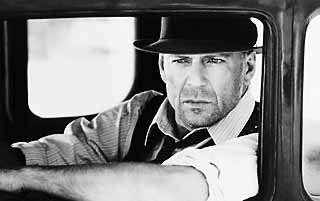https://www.austinchronicle.com/screens/1999-02-19/521214/
Scanlines
Last Man Standing
February 19, 1999, Screens
with Bruce Willis, Bruce Dern, Christopher Walken, William Sanderson, David Patrick Kelly, Karina Lombard, Leslie Mann.
|
|
Walter Hill directed this loose remake of Kurosawa's Yojimbo with John Smith (Willis) as a drifting mercenary gunman who comes into the parched, fictional West Texas town of Jericho and finds himself in the middle of a gang war between two rival bootlegging gangs. A small, near-ghost-town in Texas may seem like an improbable setting for two tweed-suited Chicago gangs, but there you have it. A gun thug vandalizes Smith's car on his way through town and suggests that he find another place to pass the time. Rather than forget it and move on, Smith goes over to the gang headquarters and puts about 20 bullets in the goon. Soon he finds himself in a bidding war between the two rival gangs, both of whom can use the services of a kamikaze triggerman. A grizzled sheriff (Dern) is totally apathetic about upholding the law and is too intimidated by the two factions to act; he is a man with a price tag hanging Minnie Pearl-style on his badge. Gang leader Doyle (Kelly) is also obsessed with a half-Indian girlfriend who he keeps as a near-prisoner; add twitchy Thompson-gunner Hickey (Walken) and you have the makings of a heavily stylized, quasi-mythic tale of good and evil blended into shades of gray, an odd combination of Western and gangster film set in Prohibition-era Texas. Smith's character is a cipher, a man with no allegiances or principles, terse, curt, and flinty; Willis' performance is as arid as the dirt streets in the rickety town of Jericho. Almost all the lines are exchanged in hoarse whispers, except for Doyle, who hollers his brains out every time the camera is turned on him, and that is the film's single biggest failing. Its dime-novel characterizations are hard-boiled to the point of evoking giggles from time to time. However, whatever shortcomings there may be in direction are more than made up for by the glorious John Woo-style gun battles. It's worth seeing just for squinty Willis walking into a place and blasting away with a Browning Hi-Power in each fist, leaving a dozen or so corpses in his wake. -- Jerry Renshaw
A Double Life
D: George Cukor (1948)
with Ronald Colman, Shelley Winters, Signe Hasso, Edmond O'Brien,
Joe Sawyer, Whit Bissell.
Actors have a tendency to be a little eccentric, even downright unstable sometimes; some become moreso than others. Tony John (Colman) is a stage thespian who is as fond of the broad gesture and booming voice offstage as on. He's been in the business for so long that he is having trouble distinguishing his own persona from the roles he plays in the theatre; his ex-wife Brita (Hasso) still works with him on amicable terms, though she can no longer stand being married to him. He accepts a role as Othello, to rave reviews; his portrayal of the murderous Moor keeps audiences spellbound night after night, but soon it begins to spill over into his personal life. He goes to a seedy Italian restaurant where he strikes up an acquaintance with waitress Pat (sex-bomb Winters, in her first film role); she invites him back to her apartment and ultimately to her bed. As John's personality disintegrates, he rambles on rain-soaked streets at night until he returns inevitably to Pat's apartment, where he replays Othello's strangling "kiss of death" on her, bellowing Shakespeare all the while. When the coroner (the always-familiar Whit Bissell) tells the story to the press, press agent Bill Friend (O'Brien) turns it around to garner more publicity for the play. John flies into a rage, imagines an affair between Friend and Brita, and tries to strangle Friend. Soon Friend realizes that there's more to the publicity stunt than he thought, and suspicion turns to Tony John for the murder. Colman supplies the perfect measure of ham-sammich theatrical mannerisms in his splenetic rendition of Othello on- and offstage; he's really a fairly pompous, insufferable character and it's no surprise his wife left him. The script was co-written by Garson Kanin and wife Ruth Gordon, who were able to bring their knowledge of the rarefied world of drama to bear on the story. Once Tony John begins to go over the edge, nearly every shot is an expressionistic metaphor for his mental state, as he shifts between lucidity and bizarre histrionics. A Double Life is an unusually intelligent, literate noir that is a classy departure from the pulpy "B" atmospherics often associated with the genre. Keep an eye out for Paddy Chayefsky and John Derek in minuscule bit parts.
-- Jerry Renshaw
Copyright © 2024 Austin Chronicle Corporation. All rights reserved.

